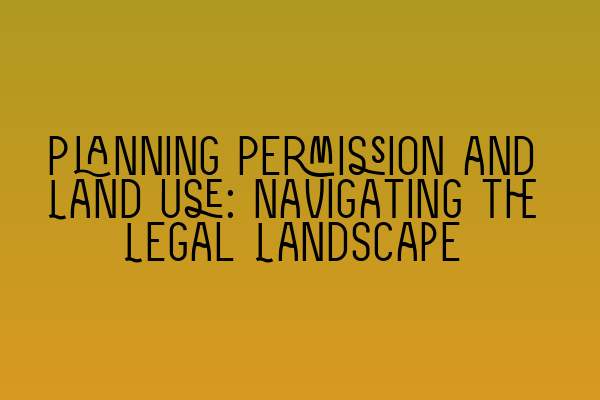Planning Permission and Land Use: Navigating the Legal Landscape
At SQE Property Law & Land Law, we understand the importance of planning permission and land use in the property development process. As a solicitor, writer, and SEO expert, I have had the opportunity to work with clients who face various challenges when it comes to navigating the legal landscape of planning permission and land use. In this blog post, I will address some key concepts and provide insights into the legal aspects surrounding these areas.
It is crucial to comprehend the significance of obtaining planning permission before undertaking any development on land. Planning permission is essentially consent granted by the local planning authority, allowing an individual or organization to carry out specific building works or change the use of a property. Without planning permission, individuals risk potential legal issues, including enforcement action, fines, and even demolition of unauthorized structures.
To ensure a smooth and legally compliant process, it is recommended to seek professional legal advice from experts specializing in property law. A dedicated solicitor can guide you through the complexities, helping you understand the regulations and requirements specific to your project. It is important to note that planning permission laws differ between England and Wales, Scotland, and Northern Ireland. As such, it is crucial to engage a lawyer familiar with the specific regulations in your jurisdiction.
Understanding the legal framework surrounding planning permission and land use can be complicated. However, to aid your understanding, let’s delve into some key concepts and terms you should be aware of:
1. Development Control: Development control refers to the process through which planning authorities assess planning applications and make decisions based on the relevant policies and regulations. It involves considering the impact of the proposed development on various aspects such as the environment, infrastructure, and local community.
2. Permitted Development Rights: Permitted development rights allow certain types of development to proceed without the need for formal planning permission. However, it is crucial to understand the limitations and conditions associated with permitted development rights, as they can vary depending on factors such as location, property type, and size.
3. Use Classes: Use classes categorize properties based on their primary function and usage. This classification system helps determine whether a change of use requires planning permission. For example, changing a property from a residential dwelling (Use Class C3) to a restaurant (Use Class A3) would typically require planning permission.
4. Environmental Impact Assessment (EIA): An EIA is a detailed assessment that evaluates the potential environmental effects of a proposed development. It aims to identify any potential impacts on areas such as noise, air quality, wildlife, and cultural heritage. EIAs are typically required for larger-scale projects or developments in environmentally sensitive areas to ensure sustainable and responsible development.
5. Conservation Areas: Conservation areas are designated areas of special architectural or historic interest that require stricter planning controls to preserve their character and appearance. If your property or development falls within a conservation area, it is important to consider these additional restrictions and obtain the necessary consent.
6. Listed Buildings: Listed buildings are structures of historical or architectural importance that are protected by law. Alterations or renovations to listed buildings often require special permission and adherence to strict guidelines to ensure the preservation of their heritage.
Navigating the legal landscape surrounding planning permission and land use can be daunting, but ensuring compliance with the regulations is crucial to avoid costly legal and financial consequences. Working closely with a property law solicitor can provide you with the essential guidance and expertise needed to achieve your development goals.
At SQE Property Law & Land Law, our team of experts is dedicated to providing comprehensive legal services tailored to your specific needs. Whether you require assistance with planning applications, change of use applications, or appeals against planning decisions, we are here to help.
If you would like to learn more about property law and related topics, we invite you to explore our website and take advantage of the wealth of resources available. Additionally, we encourage you to check out our related articles for further insights and guidance:
– Understanding Contractual Capacity: Rights and Limitations
– Interactive SQE Mock Tests for Contract Law: Test Your Knowledge
– Join Our SQE Contract Law Webinars: Expert Insights and Guidance
– Contractual Capacity: Understanding Legal Competence in Contracting Parties
– Contract Law Reforms: An Analysis of Recent Changes
Remember, when it comes to planning permission and land use, it is always better to seek professional legal advice to ensure compliance and protect your interests. To discuss your specific requirements, please get in touch with us at SQE Property Law & Land Law. We are here to provide you with the best legal support and help you navigate the complexities of property development.
